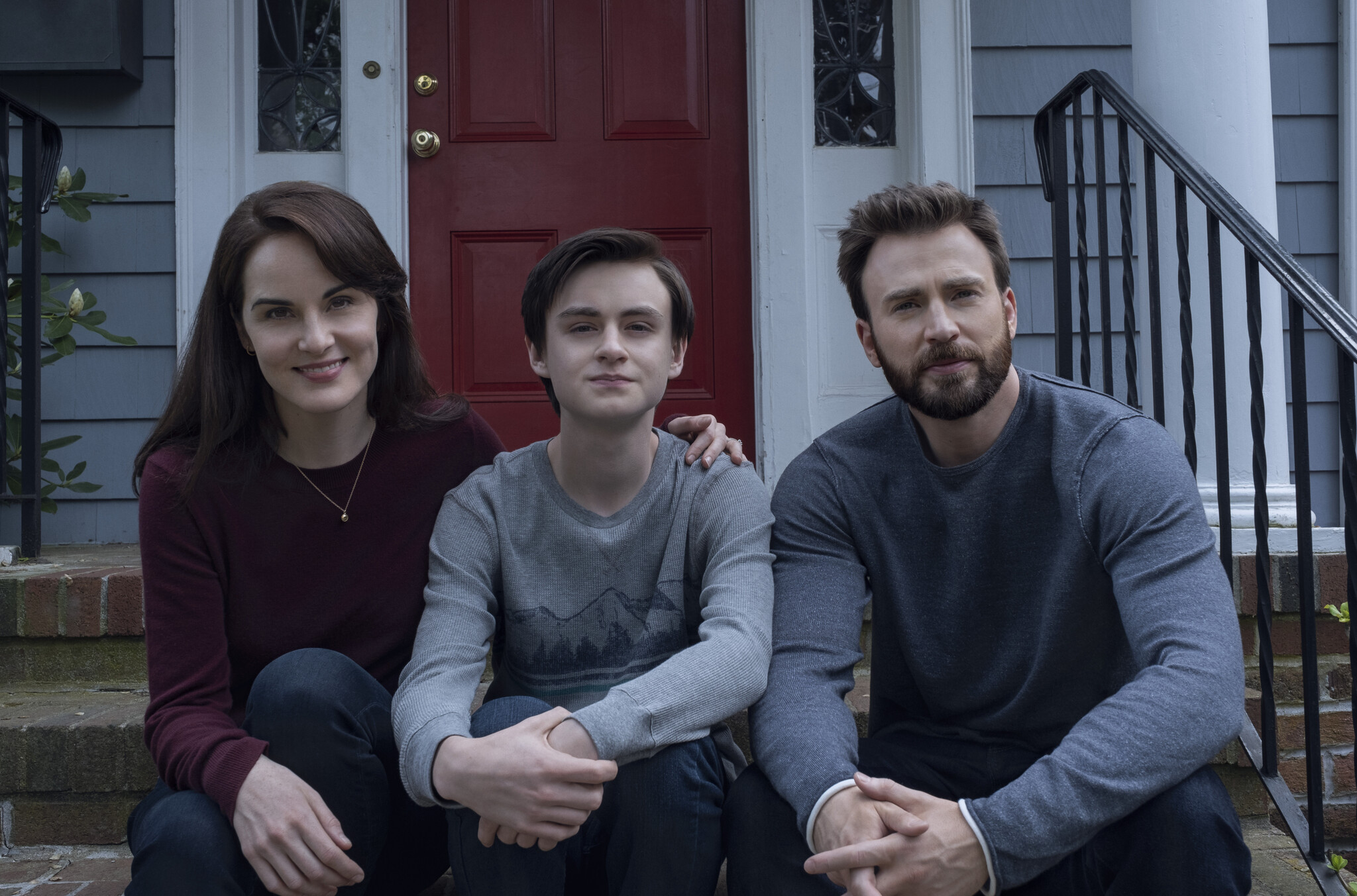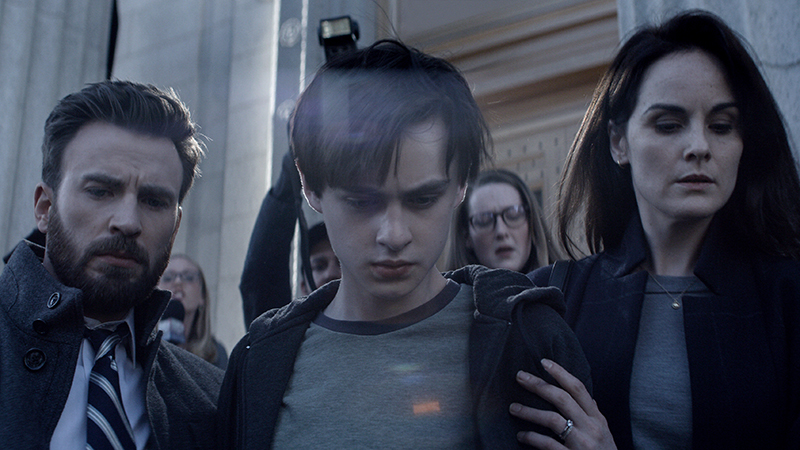After watching all eight episodes of creator Mark Bomback’s character-driven limited series adaptation of William Landay’s bestselling novel Defending Jacob, I knew there was something special about the Apple TV+ series that is so much more than a simple legal drama.
In the series, a family’s lives are irreparably disrupted when Andy (Chris Evans) and Laurie (Michelle Dockery) Barber’s son, Jacob (Jaeden Martell), is accused of murdering a fellow classmate, Ben Rifkin. Andy, an Assistant District Attorney, is forced to choose between his sworn duty to uphold justice and his unconditional love for his son as Laurie struggles with the possibility that Jacob might be guilty of murder.
RELATED: Mandatory Streamers: Chris Evans Stars in Apple TV+’s Defending Jacob
First things first, Evans, Dockery, Martell, Cherry Jones, and Pablo Schreiber put on a clinic in each episode, supported by a cast full of incredibly talented stars. Young Martell shines as Jacob, complicating your view of the teen as you consistently go back and forth between whether or not he stabbed his classmate to death. The show effortlessly balances Jacob’s presumed guilt or innocence, sprinkling in enough supporting evidence throughout the first few episodes for whichever side of the argument you fall on: is he a scared, sometimes foolish kid who thinks he has the world completely figured out at 14 years old, or is he a murderer? No matter where you stand, you can’t help but feel sorry for the kid when tears are streaming down his face as he sobs, “I want my dad. Please, I really want my dad.” The mystery plays out nicely as potential suspects are introduced outside of Jacob, including the creepy Leonard Patz or even Derek Yoo, Jacob’s classmate and former friend.
Defending Jacob’s real focal point, however, is not even the murder case. The show’s strength lies within its exploration of family, grief, and desperation. Grief comes in many shapes and sizes and is not meant only for the suffering we experience when death comes knocking on our door. In the series, we see people grieve in many kinds of ways: the loss of a child, the loss of friends, the loss of structure and normalcy, of safety, trust, respect, the truth, routine; basically the sudden loss of everything that once was. As Andy puts it, there’s only before and after, as the audience serves as witnesses to the final moments of a genuinely happy family before everything changes permanently even as the world around them keeps spinning. The one thing that’s never really lost in the show, though, is love.
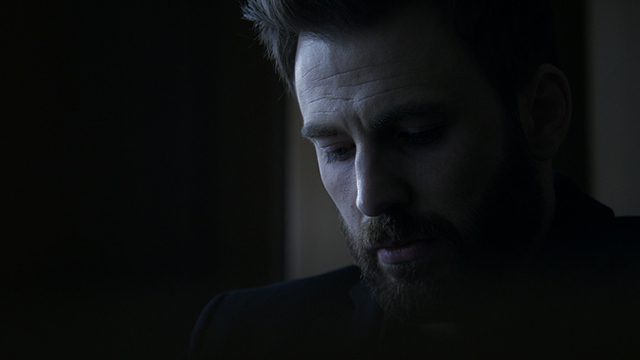
Andy’s love for Jacob is never in question, but his devotion as a father may or may not lead to questionable choices in the name of protecting Jacob from the law and even from Andy’s own father (we’ll get to that). Even before Jacob is ever formally charged for Ben’s murder, Andy, acting as a parent as well as an ADA that knows the ins and outs of the law and how investigations are carried out, throws away Jacob’s knife that could potentially be a murder weapon after Derek accuses Jacob of using it to kill their classmate. Andy ditches the knife in a neighbor’s trashcan and even waits in his car long enough to make sure the garbage truck is on its way to finish the job. He defends the action later during his grand jury hearing with Middlesex County’s new antagonistic ADA, Andy’s former protégé, Neal Loguidice (Schreiber) as those of a parent doing the right thing by disposing of his 14-year-old kid’s knife that Jacob kept secretly. However, the audience is aware that Andy’s knowledge of the legal system certainly played a part in trying to cover for his son, just in case.
This particular decision by Andy is a fascinating example of how we make things better or worse when acting out of desperation. The knife could have either proven Jacob’s guilt or even his innocence, but that’s a question we’ll never have answered since it was disposed of. It’s a thought that has to have, at one point or another, crossed Andy and even Laurie’s minds as weeks of dread weigh on them while Jacob’s trial grows closer and they begin to question which choices are the right ones. This initial action on Andy’s part serves as an eye-opening moment to how far Andy is willing to go to protect his son. The ADA quickly flips the switch on following the law to the letter to then using his education and experience to bend the rules for his kid. It would be a nightmarish situation to navigate, burdened with right and wrong when it comes to protecting your own child, knowing one incorrect move could set off a chain of events you can’t come back from.
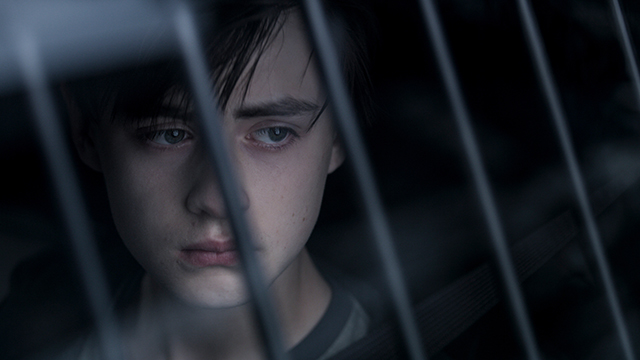
Laurie experiences a much bigger existential crisis over the eight episodes while questioning the innocence of her child. Where Andy is more willing to chalk things up to Jacob being a kid and refusing to believe, for the most part, that his son is capable of killing anyone, arguably struggling with “blind love,” Laurie’s desire for the truth and to make sense of the situation in her own mind drives many of her actions. Where Andy is able to push potential clues aimed at his son aside, Laurie can’t; though that doesn’t mean she ever stops loving Jacob, which makes the idea of him being a killer that much harder.
Then, of course, there’s Jacob himself, who is easy to sympathize with when you’re unsure about his innocence or guilt. There are moments where he sees his parents have lost a great deal due to his murder charge and the way the town now treats them all. It’s made obvious during those scenes that he genuinely feels guilty that they are suffering so much because of him, which would be difficult to carry. Hypothetically speaking, what would it feel like to be a kid innocent of a crime but helplessly forced to witness the suffering of your loved ones? What would it feel like to be a kid trying to eat dinner at a cafe with your family only to be stared at and whispered about before you’ve even been convicted? And, on the other hand, what if you were guilty of the crime? How then do you deal with the pain you’ve caused those who love you the most who are going through a nightmare caused by you?
The series brings up many profoundly complicated issues, in addition to the questions above, which is part of the reason I love the show so much. Why do we as a society move towards judgment so quickly based on practically nothing? For example, Andy and Laurie are reminded by Jacob’s attorney Joanna Klein (Jones) that if the reporters (or the court of public opinion watching on TV) waiting for them outside of the courthouse sees them cry or look even slightly angry, assumptions will be made regarding their own guilt or sincerity. This, of course, does occur as the news media determines Jacob’s guilt based solely on his facial expressions after his initial hearing when he and his parents are bombarded by screaming reporters outside of the courthouse.
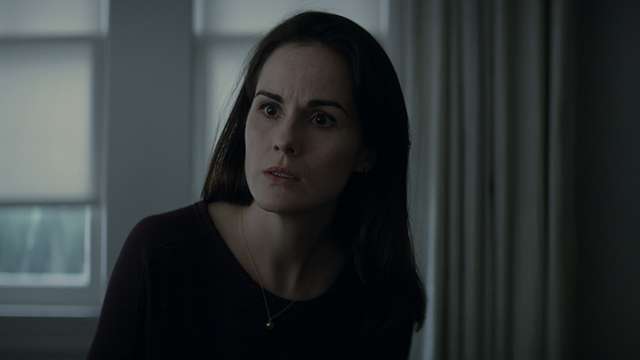
Speaking specifically on the case represented in the series, how much damage do we do by jumping to conclusions based on something as potentially meaningless as a kid’s facial expression? How much damage do we cause by blaming and ostracizing families as a whole and treating them all as guilty when only one of them might be the sole offender? How do we react if we have treated a kid poorly and he is proven innocent? Do we continue to stare and whisper? On the other hand, what if he is guilty and convicted? Does our society not allow for the sympathy of friends and family members whose only crime is that they love or loved a person who may or may not have done a terrible thing that was solely their choice and no one else’s? Why do we lean more towards righteous rage instead of a capacity for understanding? How hard would it be to go through what Andy and Laurie Barber go through as parents, and as a couple, when an entire town turns on them? These questions all boil down to our ability to show basic compassion and our society’s struggle with doing so.
Then, of course, you can never forget the parents of the child who has been brutally killed and the unimaginable pain they are going through (an element that plays a huge part in Laurie’s characterization). Are we capable of creating a space where compassion for each set of parents can coexist, where we can acknowledge the suffering of both without making their lives harder as their existence is stripped away?
The series also offers a small insight into what it means to be a defendant and how the court system often works to dehumanize them. Andy is forced to experience what it’s like to be on the defendant’s side after spending years as an ADA with the thought process that you can’t “humanize” them to juries or you’ll lose; but what about when he desperately needs the town, and the jury, to see Jacob for how he sees him? No matter Jacob’s outcome at trial, the experience will have a grave impact on Andy’s outlook on a justice system that strips away humanity.
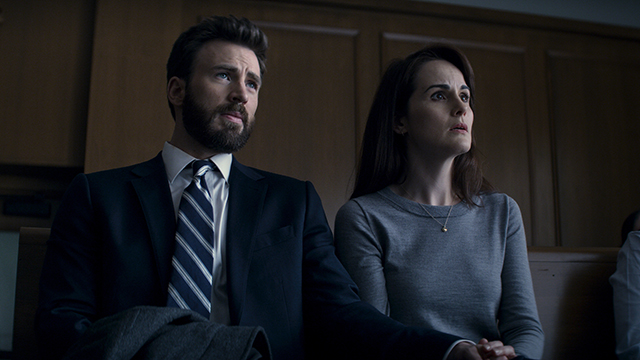
Besides the wonderful psychological exploration of the characters in the series and the many important questions the show brings up, another aspect Defending Jacob handles well are its twists. Admittedly, a few of those become a bit predictable, but even the ones you start to see coming a mile away hit you like a ton of bricks thanks to clever storytelling and perfect pacing. Even in the first episode, you assume you already know why Neal is interrogating Andy as the grand jury hearing exists months in the future and the series timeline moves back and forth between the events of the murder and Jacob’s trial and what comes after. You don’t realize until later everything that occurs later is as significant and even more shocking than the events that unfold before and during the trial.
My favorite twist is the revelation early on that Andy’s father, “Bloody” Billy Barber, played by Oscar winner J.K. Simmons, is currently doing time in prison for stabbing a college student to death. The reveal is an important piece of Andy’s psychology, including why he became an ADA, as he exhibits symptoms of trauma related to memories of his father, nightmares that plague him reminding him of the last time he saw his terrifying dear old dad in jail when he was six years old. Knowing his father is a killer and being faced with the possibility that his son could be seen as one adds to Andy’s desperation in sparing his child from a jail cell as well as his drive to be a better dad than his father ever was as Andy fights to prevent history from repeating itself.
The realization that there is a history of violence in the family also begins an exploration into the so-called “murder gene,” and the idea of whether violent tendencies could have been passed down from one generation to the next. The implication sits heavy on Laurie’s shoulders — while bringing up a lot of questions for Jacob — and also forces Andy to come face-to-face with his father once more. There’s a great scene between Andy and Billy (Evans opposite Simmons is phenomenal) when the ADA goes to see his murderous dad in prison and tells him that his son is innocent. “Yeah, me too,” Billy cracks. “Must run in the family.”
RELATED: Defending Jacob Featurette Takes You Inside Apple TV+’s New Miniseries
Defending Jacob is a stellar, heartwrenching drama that forces you to take a hard look at many questions about what we are willing to do for love, how children can suffer from the sins of their parents (and vice versa) and difficult societal topics surrounding how we see each other. Shows that make the biggest impact are the ones who demand you step into a character’s shoes not just as a witness to their experience, but by asking that you make an attempt to understand their perspective. Even if elements of the series feel similar to others we’ve seen before, it doesn’t make the story any less important, the messages any less vital, or the series — and its incredible cast — any less good.
The first three episodes of Defending Jacob are streaming now on Apple TV+ and new episodes will premiere weekly thereafter every Friday.
Defending Jacob
-
Defending Jacob
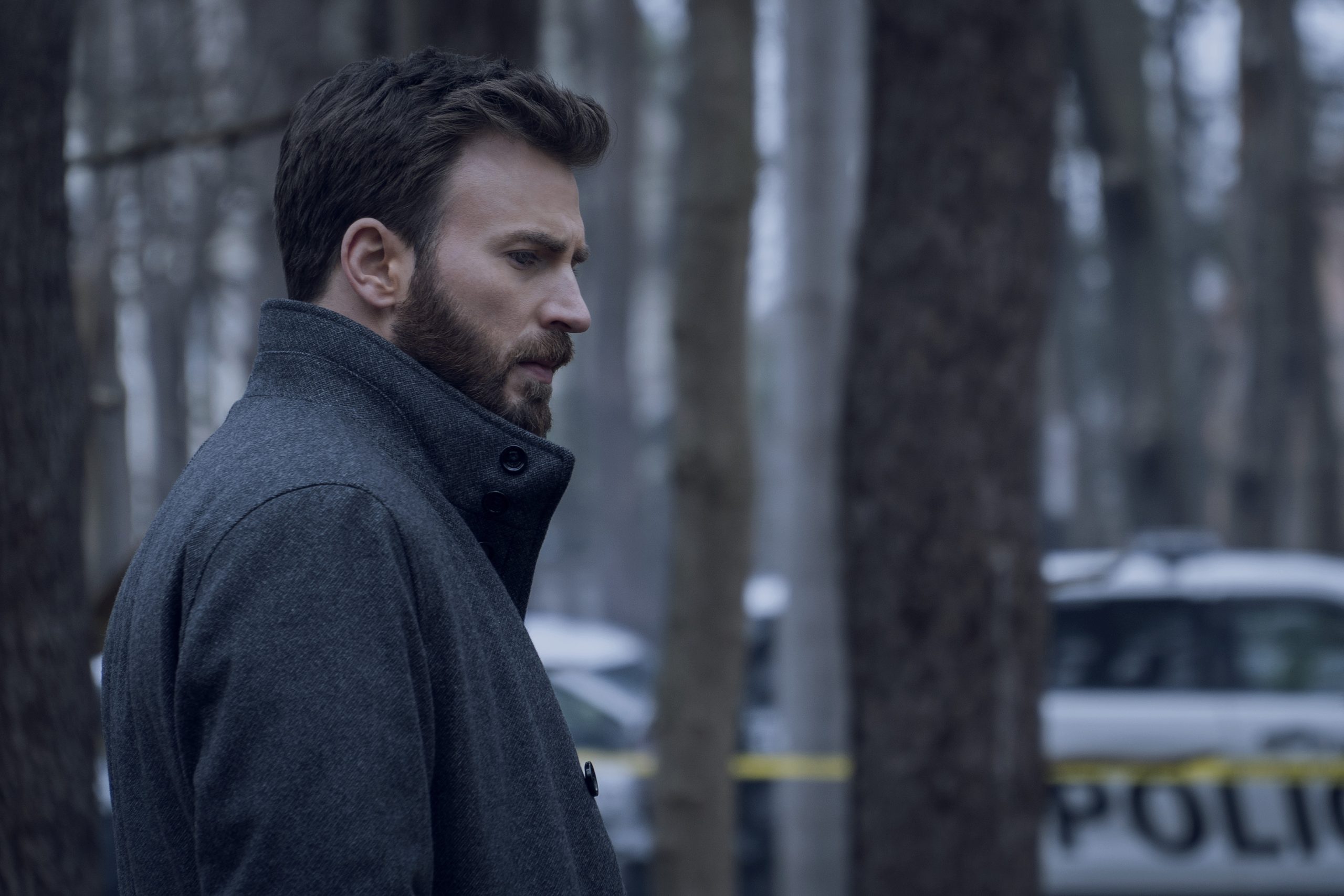
-
Defending Jacob
